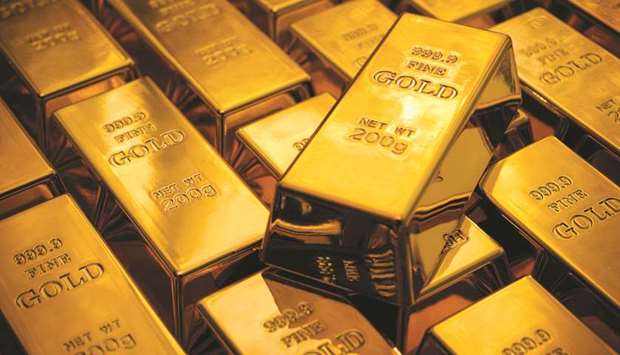Gold bulls are betting there’s more to the metal’s rally than rates. Bullion is on its way to a third straight monthly gain, trading near a six-year high as central banks signal easier monetary policy.
Gold analysts and traders are looking for affirmation from Fed chairman Jerome Powell that further reductions are in store to justify the run-up, with some saying the precious metal may have gotten ahead of itself.
“The market can easily pull back in the wake of a cut without the overall gold rally being altered, and that’s quite likely,” said James Steel, chief precious metals analyst at HSBC Securities (USA) Inc. “Trade issues are probably still going to be supportive. The general geopolitical background is supportive, and we could see some financial market volatility, which would likely be helpful for gold” on safe-haven buying.
With gold futures trading little changed near $1,443 an ounce hours ahead of the Fed’s decision, the following details show the broader bullish case for owning bullion:
Haven demand: Gold is benefiting as signs of slowing economies fuel demand for the metal as a haven asset. There are indications that things could get worse before they get better for global growth. The International Monetary Fund further reduced its outlook, already the lowest since the financial crisis, saying the projected pickup in 2020 is “precarious.”
Singapore may underscore the IMF’s case, with economic data deteriorating in the export-reliant country, raising the risk of a recession in the former tiger economy.
A Fed Bank of New York gauge puts the risk of a US recession in the next 12 months at the highest since 2008, and Societe Generale SA says bullion provides a bulwark against a recession next year sparked by trade wars and a slump in corporate-profit growth.
Industrial strength: Economies worldwide are under continued strain from slowing industrial demand. China’s purchasing managers’ index yesterday remained in contractionary territory as pressures on exporters persist. A similar gauge in Europe slipped last week, driven by shrinking factory output in Germany and France.
“Powell, talking about what’s going on with growth, said it’s more than just trade, that there’s something else going on,’’ Lakshman Achuthan, co-founder of the Economic Cycle Research Institute, said in a Bloomberg TV interview earlier this month. “From our vantage point, it’s all about a cyclical downturn in industrial growth, including China. And it’s not over in China. That industrial downturn is continuing.’’
Comfort in conflict: Gold in June posted the biggest monthly advance since the UK voted to leave the European Union three years ago. Concerns over Brexit continue to fester. A host of other potential trouble spots are now adding to the global acrimony, keeping investors awake at night.
Those include unrest in Hong Kong, tensions over the Strait of Hormuz, and global trade frictions showing signs of spreading beyond the Trump-China fracas. Bullion’s gains have come even amid strength this month in the dollar, which can often diminish the appeal of the metal.
“It’s because there’s a high level of uncertainty,” HSBC’s Steel said. “There are many improbables that I think a lot of the market can’t get a grip with, and in a case like that, increasing your gold holdings is probably a judicious thing to do because it is one of the few things you can buy that is liquid and is on nobody else’s credit.”
Earlier this month, hedge funds and other large speculators boosted their bullish position in US gold futures and options to the highest since September 2017, government data show. Billionaire investor Ray Dalio, the founder of Bridgewater Associates, said in a LinkedIn post that he sees a “paradigm shift’’ in investing coming in the next few years.
Assets “that will most likely do best will be those that do well when the value of money is being depreciated and domestic and international conflicts are significant, such as gold,” Dalio said in the post.
Set to cool?: Not all investors are convinced gold’s rally will stick after the Fed’s decision.
John LaForge, the head of real asset strategy at Wells Fargo Investment Institute, which oversees $1.9tn, said he’s expecting prices to cool because the market “is baking in too much negative-yielding debt in the future.’’ “I believe that Fed rate cuts are built into the price of gold and that it is overvalued,” LaForge said by phone. “If the Fed disappoints, or even if gold buying backs off because Fed cutting is now in the cards, I’d suspect that gold will back off to the mid-$1,300s and reset investor expectations.’’
Kristina Hooper, chief global market strategist at Invesco Ltd, which oversees $1.2tn, said that while the gold market “may be getting ahead of itself,’’ she remains positive on the metal.
“When central banks are looking to buy assets, they are running out of options,’’ she said in an interview.
“It’s like the person who’s got everything: what to get the central bank that’s bought everything? Gold is still an asset class they will look to.”

Bullion is on its way to a third straight monthly gain, trading near a six-year high as central banks signal easier monetary policy
